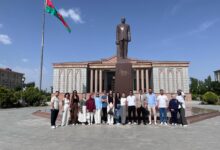
By Solmaz Isgandarli
The history of Turkic people is enriched not only by political and cultural developments but also by belief systems that have shaped their spiritual world. To deeply understand this spiritual dimension, it is essential to examine the intersection of the ideology of Turkism and the ancient Turkic faith known as Tengriism.
While **Turkism** is an ideology that emphasizes the unity, language, culture, and history of the Turkic people as a single nation, **Tengriism** reflects the natural and spiritual values that ancient Turkic societies have long held sacred.
The Essence and Ideological Foundations of Turkism
Turkism is a national ideology based on the shared identity of Turkic-speaking peoples. It emphasizes their cultural, historical, and linguistic unity. This ideology is not merely a political alliance but also aims to preserve common cultural values and pass them on to future generations. Its core principles are rooted in language unity, historical unity, common customs and traditions, and shared spiritual values.
Turkism presents itself not only as a modern ideology but also as a self-awareness inherited from the deep past of the Turks. In this respect, Turkism is not only a product of the modern era but also carries traces of the ancient belief systems of the Turks — especially Tengriism. The national soul of the Turks was born from their original worldview, which included deep reverence for the sky and nature.
Tengriism: The Turkic Soul’s Dialogue with the Sky
Tengriism is the ancient faith through which the Turk perceived their existence by looking up at the sky and silently conversed with the divine. This belief system had no temples or scriptures. Tengriism was the voice of the universe carried in the Turk’s heart — a divine breath heard in the majesty of the mountains, the flow of the waters, and the whispers of the wind.
**Tengri**, the Sky God, is the sole creator and supreme power. He is invisible but felt everywhere. Tengri neither punishes nor promises rewards. He creates humans, places them into the world, and grants them **“kut”** — a spiritual force. Every person’s *kut* is the light within. As long as one keeps this light pure, they remain close to the divine. But if the *kut* becomes tainted, the person loses their path.
Tengriism was lived not through prayers but through a deep connection with nature. For the ancient Turk, the mountain was the throne of Tengri, the sky — his face. Water symbolized spiritual purity; the tree was a bridge between life and death. It was a cosmological system guided by shamans who communicated with the spirits of the earth and sky, and it was lived with reverence for ancestral spirits.
In Tengriism, the human being is not a mere part of the universe — they are seen as the universe itself. Every person has a mission: to live justly, to do no harm to their tribe or nature, and to join the ranks of the ancestors with honor after death. Death was not an end but a transition to another realm.
The gravest sin was to betray nature, humanity, and one’s *kut*. This belief shaped the moral system of the Turk: not lying, loyalty to one’s word, hospitality, bravery, and honoring the name of ancestors.
These values were not just religious but also shaped ethnic identity, worldview, and moral behavior. In this sense, Tengriism lives on as a forgotten yet deeply rooted voice within the memory of Turkism. Its echoes remain in Turkic epics, legends, heroic figures, and even in the very language we speak.
Turkism and Tengriism: Two Pillars of the Turkic Spirit
Though Turkism is an ideology and Tengriism a belief system, both are foundational pillars shaping the identity, memory, and spirit of the Turk. Turkism is the name of national awakening and cultural revival in the modern era, while Tengriism is the ancient voice of that spirit — a dialogue with the sky.
Without a foundation in the historical roots of the people, the ideology of Turkism cannot exist as merely a political or cultural movement. It is Tengriism that provides the spiritual ground, moral essence, and philosophical basis for this idea. For the Turk, God is not merely a being — He is the order of the universe, the justice within the human soul, and a sense of morality and responsibility. These principles continue to live within the thinking of Turkism today.
For today’s Turkic youth, these values should not just be memories of the past, but the seeds of the future. As long as Turkism and Tengriism live together, the Turkic spirit will continue to walk proudly under the sky — feet on the earth, eyes on the heavens.
Solmaz Isgandarli, Active, Nationalist Youth







